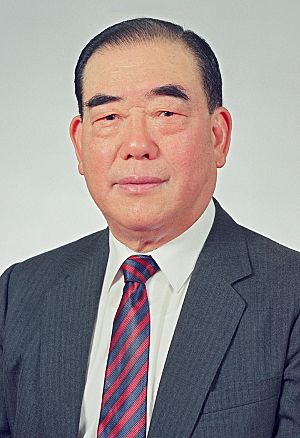Hau Pei-tsun facts for kids
Quick facts for kids
Hau Pei-tsun
郝柏村 |
|||||||||||||||||||||||||||||||||||||||
|---|---|---|---|---|---|---|---|---|---|---|---|---|---|---|---|---|---|---|---|---|---|---|---|---|---|---|---|---|---|---|---|---|---|---|---|---|---|---|---|
 |
|||||||||||||||||||||||||||||||||||||||
| Premier of the Republic of China | |||||||||||||||||||||||||||||||||||||||
| In office 1 June 1990 – 27 February 1993 |
|||||||||||||||||||||||||||||||||||||||
| President | Lee Teng-hui | ||||||||||||||||||||||||||||||||||||||
| Vice Premier | Shih Chi-yang | ||||||||||||||||||||||||||||||||||||||
| Preceded by | Lee Huan | ||||||||||||||||||||||||||||||||||||||
| Succeeded by | Lien Chan | ||||||||||||||||||||||||||||||||||||||
|
|||||||||||||||||||||||||||||||||||||||
| Personal details | |||||||||||||||||||||||||||||||||||||||
| Born | 8 August 1919 Yancheng, Kiangsu, Republic of China |
||||||||||||||||||||||||||||||||||||||
| Died | 30 March 2020 (aged 100) Neihu, Taipei, Taiwan (Republic of China) |
||||||||||||||||||||||||||||||||||||||
| Resting place | Wuzhi Mountain Military Cemetery | ||||||||||||||||||||||||||||||||||||||
| Nationality | Republic of China | ||||||||||||||||||||||||||||||||||||||
| Political party | Kuomintang (1938–1995, 2005–2020) | ||||||||||||||||||||||||||||||||||||||
| Spouse |
Kuo Wan-hua
(m. 1950; died 2018) |
||||||||||||||||||||||||||||||||||||||
| Children | 2 sons 3 daughters |
||||||||||||||||||||||||||||||||||||||
| Military service | |||||||||||||||||||||||||||||||||||||||
| Allegiance | Republic of China | ||||||||||||||||||||||||||||||||||||||
| Branch/service | Republic of China Army | ||||||||||||||||||||||||||||||||||||||
| Years of service | 1938–1989 | ||||||||||||||||||||||||||||||||||||||
| Rank | Senior General | ||||||||||||||||||||||||||||||||||||||
| Battles/wars | Second Sino-Japanese War World War II Chinese Civil War Second Taiwan Strait Crisis |
||||||||||||||||||||||||||||||||||||||
| Chinese name | |||||||||||||||||||||||||||||||||||||||
| Chinese | 郝柏村 | ||||||||||||||||||||||||||||||||||||||
|
|||||||||||||||||||||||||||||||||||||||
| courtesy name | |||||||||||||||||||||||||||||||||||||||
| Chinese | 伯春 | ||||||||||||||||||||||||||||||||||||||
|
|||||||||||||||||||||||||||||||||||||||
Hau Pei-tsun (born August 8, 1919 – died March 30, 2020) was an important Chinese politician and military leader. He served as the Premier of the Republic of China (ROC) from 1990 to 1993. Before that, he was the longest-serving Chief of the General Staff for the Republic of China Armed Forces from 1981 to 1989. In 2017, he visited Mainland China, which was a notable event because he was the first former ROC premier to do so since 1949. He lived to be 100 years old.
Contents
Early Life and Military Career
Hau Pei-tsun was born into a well-off family in Yancheng, Jiangsu, on August 8, 1919. He received a strong military education. He attended the Republic of China Military Academy and other important military schools.
In 1938, Hau became an artillery officer. He served in the Chinese forces in India during World War II. Later, he was a staff officer during the Chinese Civil War.
Key Military Roles
From 1958 to 1961, Hau was the commander of the 9th Infantry Division. During this time, he oversaw the defense of Quemoy during a 44-day attack by the People's Liberation Army.
He continued to rise in the military. He commanded the 3rd Corps from 1963 to 1965. He also served as the Chief Aide to President Chiang Kai-shek from 1965 to 1970.
Hau held many other high-ranking positions. These included Commander-in-Chief of the ROC Army from 1978 to 1981. He then became the Chief of the General Staff in the Ministry of National Defense from 1981 to 1989.
Political Career
Hau Pei-tsun was a member of the Central Standing Committee of the Kuomintang (KMT) party from 1984 to 1993. He served as the Minister of National Defense from 1989 until 1990.
Becoming Premier
In 1990, President Lee Teng-hui appointed Hau as the Premier of the Republic of China. This decision was partly to bring together different groups within the KMT party. Some people protested this choice because they worried it meant a return to military rule. However, President Lee defended his decision. He said he valued Hau's strong stance against crime.
As premier, Hau was very popular. He was tough on crime and introduced a large economic plan. This plan aimed to help Taiwan's economy grow and become more industrial. Hau resigned in January 1993. This happened after the KMT party did not perform well in the 1992 Legislative Yuan election.
Later Political Activities
After his time as premier, Hau became one of four vice-chairmen of the KMT. He served in this role from 1993 to 1995.
He was later removed from the Kuomintang party. This was because he supported candidates from the New Party in the 1995 legislative elections. In the 1996 presidential election, he ran as the running mate for Lin Yang-kang. Hau rejoined the KMT party in 2005.
Personal Life
Hau Pei-tsun was married to Kuo Wan-hua. They had two sons and three daughters. One of his sons, Hau Lung-pin, also became a politician. He served as the former chairman of the New Party and was once the Mayor of Taipei.
Kuo Wan-hua passed away on September 12, 2018, at the age of 96. Hau Pei-tsun became a Christian on December 31, 2017.
Hau Pei-tsun died on March 30, 2020, at the age of 100. He passed away due to multiple organ failure at Tri-Service General Hospital. After his death, he received a special award from the president.
 | Calvin Brent |
 | Walter T. Bailey |
 | Martha Cassell Thompson |
 | Alberta Jeannette Cassell |

